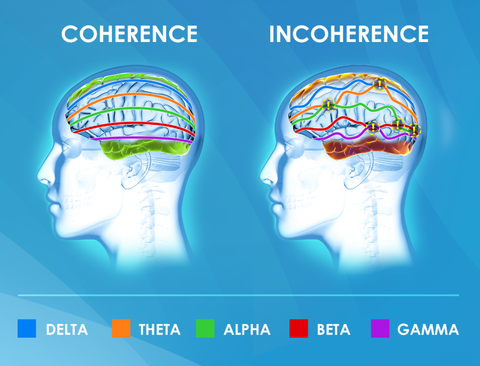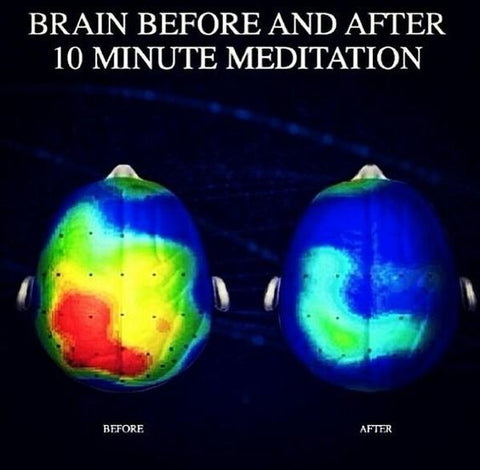Why Should I Start Meditating (Key Benefits Explained)

I've heard of meditating plenty of times, but I always thought is just something Oprah yapped about on daytime television or for spiritual guru's.
It wasn't until I actually tried meditating with an open minded approach that I actually experienced the benefits.
Also I learned that Kobe Bryant used meditation daily to start his day and to out-work his competition. This fact inspired me to learn more about meditation.
Here's what I learned, why you should start meditating, and the benefits you can get out of meditation.
Why Should You Start Meditating

Ok, meditation won't get you a mansion and 5 Ferrari's. But meditation could help you develop a well thought out business plan.
Meditation is an ancient tradition passed down from generation to generation for thousands of years across multiple cultures.
Based on my experience, techniques that don't work, don't get passed down.
Even after 1,000's of years, the popularity of meditation continues to rise as more people discover the significant advantages that meditation provides.
Meditation is widely recognized by high level social circles as one of the best methods to master the mind.
With increasingly hectic lifestyles driven by technology, there is now a greater need to reduce stress efficiently with our busy schedules and demanding routines.
Meditation is a free way to master your mental state, reduce anxiety, and optimize your brains organization.
Meditation Goals
You don't need to take an hour out of your day to meditate. I do in with 15 minutes in the morning.
Thats it.
Meditation has helped me develop valuable self discipline habits, healthy sleep patterns, and even heightened pain tolerance.
The main goal of meditation is to attain the following:
- Inner peace and relaxation
- An improvement in mental and physical health
- Finding awareness – self and surrounding
- Greater focus and concentration
Understanding What Exactly Is Meditation?
 Meditation is the practice of engaging in deep thought and focusing the mind in a single direction without any distractions.
Meditation is the practice of engaging in deep thought and focusing the mind in a single direction without any distractions.
It's harder than it sounds, but don't take my word for it. Try to focus on one thought for 15 minutes with-out being distracted.
Meditation helps coach the mind.
With practice, this allows you to gain better focus and gives your thoughts a clear direction and resolution.
Ahh. Peace of Mind.
By practicing meditation you get increased inner harmony (less internal conflict and rambling thoughts), increased self-awareness, and an enhanced awareness of your effect on your surroundings.
With 15 minutes in the morning I meditate to better understand my place in the world and the effect I'm going to have on the day.
Meditation helps me visualize where I currently stand in relation to my overall goals and what obstacles I need to look out for next.
7 Proven Benefits of Meditation
There's more than a few ways you can use meditation to your benefit. here's the biggest benefits according to the biggest names in the Meditation Industry.
-
Stress Relief
 As we all go through the day we're constantly exposed to different stresses in varying degrees.
As we all go through the day we're constantly exposed to different stresses in varying degrees.
Our body's stress response helps us to cope, but lingering stress is common and can continue to build up over time.
Meditation produces an opposing effect on stress by activating the body's relaxation response.
After your stress filled day, a meditation session can help you body repair itself and restore stress and anxiety levels to a normalized level.
Meditation also helps control your "stress-induced thoughts" that trigger your body's stress response.
Natural stress relief is one of the biggest reasons why people start meditation routines.
-
Anxiety Control
Everyone has "anxiety" in today's world.
Anxiety is something that "we" as a society need to de a better job understanding and combating the root cause of. Not just medicating with prescription pills.
Anxiety is our body's way of telling us, "Hey, I'm restless because your overthinking".
Meditation exercises have the potential to cut back anxiety levels substantially.
Meditation helps to organize your brain and bring coherence to your thoughts.
A study published by the National Institute of Health in 2014 found that eight weeks of meditation helped cut back anxiety symptoms in folks with generalized anxiety disorder.
Meditation may also facilitate the management of job-related anxiety.
Another study found that employees using a mindfulness meditation app for over eight weeks had improved feelings of well-being and lower job strain.
With Meditation, it becomes easier to recognize triggering thoughts, and you begin to find various ways you can find your way around those thoughts.
-
Improved Emotional health
Emotional health is huge but, speaking from personal experience, often set aside and overlooked.
Meditation can lead to an improved self-image and a positive outlook on life by decreasing levels of inflammatory chemicals in your brain that result in depression.
As an example, "self-inquiry meditation" aims to help you develop a more extensive understanding of yourself and how you relate to those around you.
I found this to be difficult and often in conflict with my own ego, but overall a great practice for a deeper understanding in myself.
Meditating about yourself can enable you to acknowledge thoughts that may turn out to be harmful if left unchecked.
Science verifies Meditation's effectiveness at mitigating depression, schizophrenia, anxiety, PTSD, and ADHD.
A study published in 2015 found that Meditation can help cope with negative emotions in just a single meditation session.
-
Enhanced attention span
 Meditation works by helping you train your mind to keep your attention focused.
Meditation works by helping you train your mind to keep your attention focused.
It can drastically improve attention spans by having you focus on a single object, such as a goal, visual image, or sound (music).
I didn't realize how low my attention span was until I started meditating and forcing myself to focus.
The more you practice, the better you become at phasing out the distractions and achieving mental clarity.
-
Improvement In Your Memory
 Meditation can do wonders when it comes to memory in two significant ways:
Meditation can do wonders when it comes to memory in two significant ways:
- Prevention of Age-Related Memory Loss:
Meditation results in improvements in attention and clarity of thinking, proving benefits ffor older people with age-related memory loss or dementedness.
Studies have shown that Meditation results in enhanced awareness, memory boost and mental quickness in people above 60.
- Helps Zone Out Negative Memories:
Our past experiences comprise excellent and bad events both while our memory stores the past and clings on to the adverse events rather than the positive ones.
One of the prime reasons behind depression can be overthinking past adverse events. Regular Meditation helps cleanse the past adverse events from our memory
-
Sleep Improvement
This is the biggest benefit from meditation that I've experienced.
Meditation can be an incredibly effective strategy to increase the sleep you get nightly.
It can help train by preventing the mind from getting caught up in thoughts – a tendency which is the strongest for all of us at bedtime.
Meditation lets the body relax by easing the emotional tension and eliminating "runaway thoughts" that interfere with sleep.
It does so by enabling you to let go of everything that happened or everything you listened throughout the day, helping the mind relax while resting the body simultaneously.
Daily Meditation not only shortens the time it takes to go to sleep but significantly enhances sleep quality.
If you are experiencing insomnia that doesn't go away on its own, Meditation can turn out to be a natural sleeping aid on its own, eliminating the need for sleeping pills.
-
Pain Management
The perception of pain depends on your state of mind, and it often increases as you enter more difficult conditions.
However, living with pain, whether it's chronic or acute, is detrimental to your physical well-being and emotional health.
Pain makes simple everyday tasks challenging and sometimes outright impossible.
Incorporating Meditation into the daily routine helps the brain release endorphins, which are natural pain relievers.
Meditation also helps scale back intense pain, improve quality of life, and reduce symptoms of depression in individuals with chronic pain.
Meditation is one of the most effective methods that can you can employ as part of pain management.
As per research, Meditation can be more effective than drugs and surgery to alleviate chronic low-back pain.
8 Tips For Getting Started With Meditation
 You don't have to find a guru in the mountains to get started with meditation.
You don't have to find a guru in the mountains to get started with meditation.
Just dedicate 10-20 minutes for yourself (no distractions) and dive right in.
-
Chose a peaceful and silent place, preferably in the morning time, when the traffic is minimal, and there are no sounds or significant distractions
-
Don't stress too much about where you sit as you meditate since there is no hard and fast rule. You can sit on the floor, lay a mat or even chose a high place to sit.
-
Concentrate fully on your breathing. Recognize your thoughts when you pause to breathe at the extreme points of exhaling and inhaling.
-
Be ready to control your thoughts since all sort of thoughts will attack you once you begin Meditation. It's easy to "relapse" and get distracted and to forget about concentrating on breathing.
Don't entertain your distracting thoughts. Let them pass while keeping the focus directed towards breathing. A few days of consistent practice will gain you the control you need over your thoughts.
-
There is no stipulated or fixed time for Meditation. As a beginner, you can start with 10 or 20 minutes and take it forward from there. It may help if you set a timer or stopwatch and try to meditate for as long as the time you designated.
-
Remember that the key to Meditation is to let go of the body and be comfortable with Meditation in any state, i.e. walking or working or while away from home.
-
End your Meditation calmly and by the end of the session, take a moment to praise how well you have done (regardless of whether you struggled).
-
Remember, like everything else, consistency is indeed vital for Meditation too.
Take at least 10-15 minutes out of your everyday routine for Meditation, dedicated to setting up the place, prepping yourself and finally practicing Meditation.
Final Thoughts
At the end of the day - Meditation feels good and leaves you with a sense of satisfaction.
Enjoy the moment to yourself.
The benefits of meditation grow over time. Certain benefits like stress and anxiety relief can be noticed quickly.
But the biggest benefits may be your increased level of consciousness over time as taking time for meditation increases your overall and self awareness.
Meditation is not meant to be forced because once you push it, it turns into a tedious chore. Just enjoy it.
If you enjoyed this article (or if you hated it) let us know your thoughts in the comments below…
Also, check out our SERIOUSLY UNIQUE collection of ‘Higher Level’ “Consciousness” Hoodies, Shirts, and Leggings in our online store…
Thanks for reading !

- The Conscious Vibe
- Get More Out of LIFE


